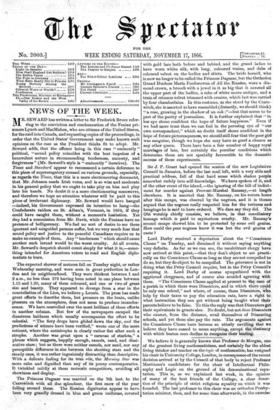NEWS OF THE WEEK.
- MR. SEWARD has written a letter to Sir Frederick Bruce refer- ring to the conviction and condemnation of the Fenian pri- soners Lynch and MacMalion, who are citizens of the United States, for the raid into Canada, and requesting copies of the proceedings, in order that the United States' Government may make known such opinions on the case as the President thinks fit to adopt. Mr. Seward adds, that the offence being in this case " eminently " political, "sound policy coincides with the best impulses of a benevolent nature in. recommending tenderness, amnesty, and forgiveness" (Mr. Seward's style is " eminently " iterative). The Times and Standard appear to recommend a certain deference to this piece of supererogatory counsel on various grounds, especially, as regards the Times, that this is a mere electioneering document, that Mr. Johnson needs Irish votes, and is so wise and moderate in his general policy that we ought to take pity on him and play Into his hands. No doubt it is a mere electioneering manoeuvre, and therefore we hope no attention whatever will be paid to this piece of irrelevant diplomacy. Mr. Seward would have hanged —indeed, his Government expressed its intention to hang—the Confederate raiders on St. Alban's, Vermont, in 1864, if they could have caught them, without a moment's hesitation. Yet they had a commission from Mr. Davis, while the Fenians have no pretence of belligerency. We feel no sort of desire to see these ignorant and misguided persons suffer, but we very much fear that sound policy and justice to the peaceful Canadians require us to make an example of them. Any " tenderness" which should cause another such inroad would be the worst cruelty. At all events, Mr. Seward's despatch should count simply for what it is,—some- thing intended for American voters to read and English diplo- matists to burn.






























